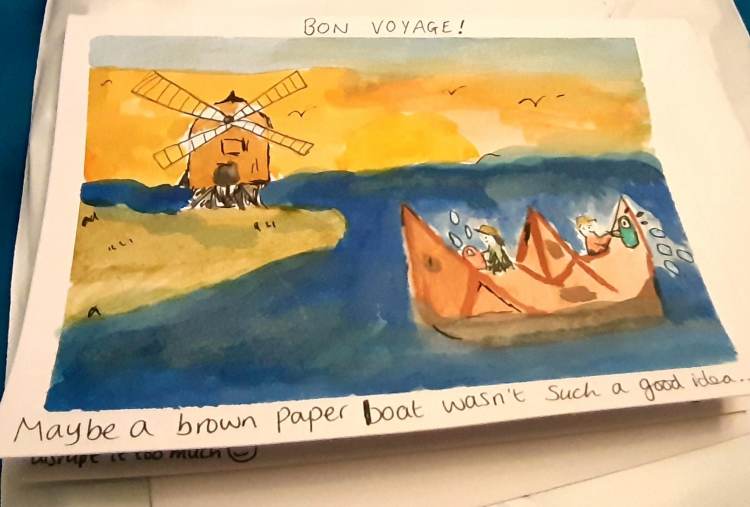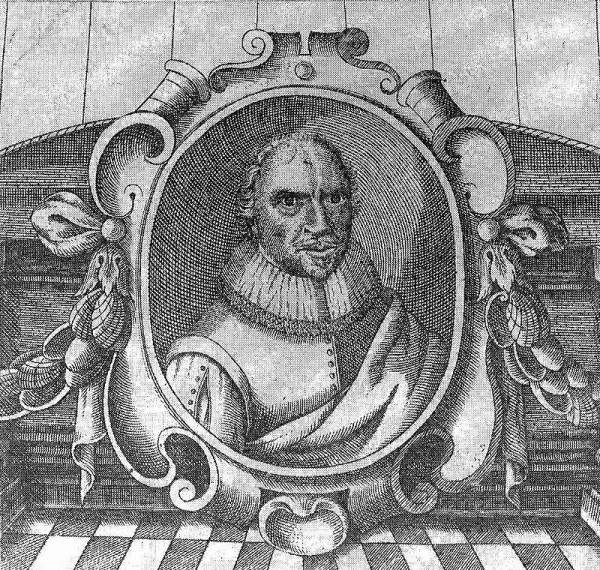Sailing down the Thames in a brown paper boat is a rather unusual idea to say the least. One that many people would never imagine doing, but apparently someone did just that in 1620.

The person in question was John Taylor, author of “one of the earliest and most enthusiastic” texts in English, on the merits of a fibre often used for making brown paper – hemp.
John Taylor was born in 1580 in Gloucester as the son of a chirugeon (surgeon), who, after a few years of schooling, moved to London and became a waterman, ferrying the public up and down and across the Thames.
At the age of 16 he was one of many to enrol in the Navy and served with Sir Walter Raleigh and the Earl of Essex on the 1596 expedition to Cadiz, and other expeditions to Azores.
Unfortunately, following the coronation of James I in 1603, working as a Thames waterman and serving in the Navy became much less profitable. The number of watermen rose dramatically, and fares had remained unaltered since the days of Queen Mary, 60 years previous. He appealed directly to the King but was ignored.
He decided to change tactics and took up writing. He developed a rather unique, for the time, way to entertain people and involve them in some of the wider elements of his imagination and started to ‘live out his fantasies.’ This involved him proposing a challenge, such as a ‘poetic duel’ at the Hope Theatre in London against William Fennor in 1614. He was booed off the stage but became much better known by the public. London was a small town so once you had a name, ‘people would point you out in the street and talk about you.’

Once he had an idea, he would print up handbills describing his adventure and invite readers to subscribe any amount of money they could (although no less than sixpence was allowed,) to be paid if he succeeded. At the end of each adventure he published an account in prose and verse, praising those who had helped him on his challenges, and insult those who had treated him badly. He sounds like quite a character- he often found many subscribers but struggled to collect the money after his successful challenges. Upon his return of one of his earliest challenges, entitled Penniless Pilgrimage, (in which he decided to travel from London to Edinburgh and back again without spending any money, ‘neither by borrowing nor stealing on the journey’), some 750 of his debtors refused to pay. So, he wrote a pamphlet, with a rather amusing title “A Kicksey-Winsey or a Larry-come-Twang,” where he threatened to name, ‘satirise, cauterise, and stigmatise all the whole kennel of curs.’ If his sponsors still refused to pay. He then got much of his money.
Arguably, his most fascinating challenge was his voyage down the Thames in a brown paper boat, with a companion, Roger Bird. He decided to take this challenge to celebrate the virtues of paper and hemp, a fibre used in many types of paper. He also discusses hemp at length in his poem “The Praise of Hemp.”
His description of their Epic Voyage down the Thames comes at the end of a ‘considerably long’ poem, in which he mostly covers the myriad of uses and possibilities for hemp. This included oil and textile manufacture. His greatest praise is its use in papermaking, in his epic called “The Originall of Paper.”
Unfortunately, we know very little about the boat. We do not know what the boat looked like, the size or how it was crafted. Despite this it is believed he managed to sail a reasonable distance, over at least a day:
“I therefore to conclude this much will note
How I of paper lately made a Boat,
And how in forme of Paper I did row,
From London unto Quinborough Ile show
I and a Vintner (Roger Bird by name)
(And a man whom Fortune never yet could tame)
Tooke shipe upon the vigil of Saint Iames
And boldly ventur’d downe the River Thames
Laving and cutting through each raging billow,
(In such a Boat which never had a fellow)
Having no kinds of metal or no wood
To help us eyther in our Ebbe or Flood”
However, disaster struck as they headed down river towards the open sea “twixt Essex, Calves and Sheepe of Kent”- the boat began to leak!
“The water to the Paper being got,
In one halfe houre our boat began to rot:
The Thames (most lib’rall) fild her to the halves,
Whilst Hodge and I sate liquoured to the calves”
Taylor and Bird had attached eight bullocks’ bladders filled with air as buoyancy bags, although this did little to help the situation.
“….such we fear’d the graves our end would be
Before we could the Towne of Gravesend see:
Our boat drunke deeply with her dropsie thirst,
and quaft as if she would her bladders burst,
Whilst we within sixe inches of the brim
(Full of salt water) downe (half sunck) did swim
Thousands of people all the shores did hide,
And thousands more did meet us in the tide
With Scullers, Oares, with ship-boats, & with Barges,
To gaze on us, they put themselves to charges.”
Once rescued, they stayed the night at Queensborough before returning to London by coach. Unfortunately, their boat did not survive.
“But whilst we were at our dinners thus were merry
The Country people tore our tatter’d wherry
In mammocks peecemeale in a thousand scraps
Wearing the reliques in their hats and caps”
Taylor ends his poem with a curse upon his subscribers who refused to pay up, particularly those who refused to pay his friend Robert Bird
“And those that doe his coin from him detaine
(Which he did win with perill and much paines)
Let them not thinke that e’re ‘twill doe them good,
But eate their marrow and consume their blood
The worme of conscience gnaw them every day
That have the meanes, and not the will to pay
Those that are poore, and cannot, let them be
Both from the debt and malediction free…
…Thus ending (like to Jason’s Golden-fleece)
This work of Hempseed is my Master-peece.”
Taylor went on to complete many more challenges and write many more poems over the years. He enjoyed many comforts but none so much as clean bed linen, which was his favourite thing, and often the subject of many of his poems praising the hospitality he was shown from the various places he went to. He continued his writing and adventures, until his death around 1653.
